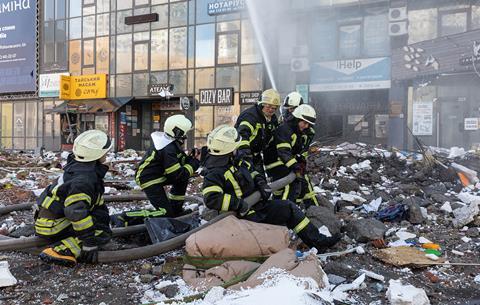- News

All the latest updates on building safety reformRegulations latest
- Focus
- Home
- News
- Focus
- Comment
- Events
- CPD
- Building the Future
- Jobs
- Data
- Subscribe
- Building Boardroom
Net zero at risk as global energy concerns from Ukraine war send green goals back down the agenda
By Tom Lowe2022-03-16T07:00:00

Agreements reached at COP26 were always going to be vulnerable to the unexpected, but the case for energy efficiency and alternative supply sources is now even more urgent

Source: Shutterstock
Emergency services work to limit the damage following a Russian rocket attack on Kyiv
Last autumn’s COP26 climate conference was supposed to be a watershed moment for the net zero agenda. Building attended the event in Glasgow, and saw at first hand how a sense of optimism was pervading the construction sector. The pandemic seemed to be ending, the stars had aligned, and the time had arrived for firms to transform themselves into greener, more efficient and more sustainable operations that were fit for the future.
The mood was driven by successes in the political arena, with governments agreeing targets covering 80% of the world’s carbon emissions. Deforestation, methane emissions and coal production all saw deals which represented major leaps forward. For construction, the market pressure implied by this could not be misunderstood: net zero was now not only morally non-negotiable, it was a matter of long-term commercial survival.
Despite a last-minute row with India and China over whether coal should be “phased out” or “phased down”, the stage seemed to be set for a rapid acceleration of net zero policies in the months ahead. Few, if anyone, foresaw that the biggest European war in 75 years was about to change everything.
…
Already registered? Login here
To continue enjoying Building.co.uk, sign up for free guest access
Existing subscriber? LOGIN
Stay at the forefront of thought leadership with news and analysis from award-winning journalists. Enjoy company features, CEO interviews, architectural reviews, technical project know-how and the latest innovations.
- Limited access to building.co.uk
- Breaking industry news as it happens
- Breaking, daily and weekly e-newsletters
Get your free guest access SIGN UP TODAY

Subscribe now for unlimited access
Subscribe to Building today and you will benefit from:
- Unlimited access to all stories including expert analysis and comment from industry leaders
- Our league tables, cost models and economics data
- Our online archive of over 10,000 articles
- Building magazine digital editions
- Building magazine print editions
- Printed/digital supplements
Subscribe now for unlimited access.
View our subscription options and join our community

















